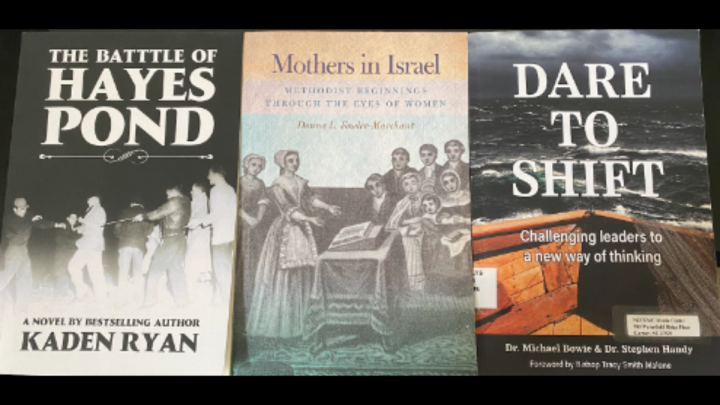“A reading people will always be a knowing people.” – John Wesley
As a gift for my departure from Elon University before I began seminary at Duke, then Chaplain Richard McBride gifted me with The New Oxford Annotated Bible and included these words: David – the single most important piece of advice from seminary days – LEARN TO READ THE BIBLE WITH THE GOOD BOOK IN ONE HAND AND THE NEWSPAPER IN THE OTHER. I learned later these words came from Karl Barth. Today, the newspaper is being replaced with our phones and tablets, and yet, Barth’s words continue to hold true.
Staying on the seminary track for a moment, I remember learning about John Wesley being “a man of one book,” and encouraging pastors to read. In a letter to pastor George Holder on November 8, 1790, John Wesley said “It cannot be that the people should grow in grace unless they give themselves to reading. A reading people will always be a knowing people.”
Many of you may have spent some time reading this summer, perhaps during vacation time, during your weekly Sabbath, or after a full day. In acknowledgement of John Wesley’s encouragement to read, I offer these three recent titles for your consideration.
The Battle of Hayes Pond by Mr. Kaden Ryan – Ken Locklear first told me the story of Hayes Pond, where members of the KKK faced the Lumbee community in 1958. How thankful I was for the newspaper articles Ken shared about this incredible Lumbee history. (This link offers a short summary of the events from 1958 and includes three videos of eyewitness accounts.) Kaden’s novel is an informative work, as he weaves the stories of the men and women engaged with this historic moment of commitment and resilience among the Lumbee. Thank you to Janice Locklear at Eagle Feather Arts (402 W 3rd St, Pembroke, NC 28372, 910.522.0508) for recommending the book.
Here’s an excerpt from the chapter, “Pure Evil II” (page 66):
As the sun set on the eve of the rally, the community stood on the brink of a momentous standoff… This was not a fight for territory; it was a fight for the spirit of pride, a battle against the darkness that sought to divide and conquer. And in this battle, the Lumbee people from all over Robeson County stood as one, they were citizens of hope and a force of unwavering courage.
Mothers in Israel – Methodist Beginnings Through the Eyes of Women by Dr. Donna L. Fowler-Marchant – After seeing Donna at Annual Conference and getting a signed copy of her book, I was eager to get started reading. It is obvious Donna did her research, with plenty of excerpts to help tell the story of the ways women impacted the early Methodist movement. The reader will learn about Susanna Wesley, Sarah Crosby, Mary Bosanquet Fletcher, and others, through an intimate look at their efforts to lead lives of holiness and employ the gifts God provided them for their ministries. The book serves as a great resource for small groups, personal development, a Sunday school class, or book club, and I highly encourage those of us seeking a deeper understanding of the role of women in our Methodist history to begin reading soon.
Here’s an excerpt from the chapter, “New Directions in Ministry” (page 111) about Mary Bosanquet and her commitment to humility:
This model of community laid out by Mary Bosanquet was one of humility. As she planned for the creation of her household with its orphanage and school, she envisioned a Christian life lived in community and rooted in a desire for holiness and happiness that was fleshed out by putting on the virtues of poverty, chastity, and obedience.
Dare to Shift: Challenging Leaders to a New Way of Thinking by Dr. Michael Bowie and Dr. Stephen Handy – Remember hearing how we had to pivot during COVID? Using the theme of resurrection, Bowie and Handy offer up a helpful leadership book with scriptural references blended with personal stories, highlighting many of the words and phrases we might remember from our Course of Study and seminary classes. There are questions at the end of each chapter which enable the reader to consider one’s own habits/practices. Chapter three was a particular favorite for me, as it highlighted the “five generations influencing culture, the workforce, and society simultaneously” (p. 63), and used two-page summaries for each of the five generations.
Here’s an excerpt from the chapter, “Reevaluating Stewardship” (pages 123-4):
Churches seeking innovative ways to engage their communities must experience a shift from being private to public in how they witness to others. This shift requires leaving the comfort we may feel within the four walls of the sanctuary and intentionally engaging in the life of the surrounding community. Not only are we compelled to go beyond the four walls, but we are called to assess and discern the needs and injustices hindering our communities from prospering.
Looking for one of the above books? Be sure to check out the Media Center, where Laura Dallas can help you with all of the above books and is always ready to assist. And if you have a recommendation for a good book, let me know!
Blessings, David
David
photo credit David Blackman

